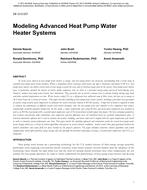
DE-13-C037 — Modeling Advanced Heat Pump Water Heater Systems
- Comments Off on DE-13-C037 — Modeling Advanced Heat Pump Water Heater Systems
- ASHRAE
In recent years, interest in heat pump water heaters as energy- and cost-saving devices has increased, corresponding with a recent surge in available heat pump water heater products. While a traditional electric resistance tank heater can offer a theoretical maximum COP of 1, heat pump water heaters can deliver several units of heat energy to water for every unit of electrical energy used by the system. Heat pump water heaters have, in particular, sparked the interest of electric utility companies, who see them as a potential energy-saving and peak load-reducing asset. However, modern heat pump water heaters have limitations. They generally rely on electric resistance heat to provide backup during large loads and when ambient temperatures are low. Water heaters using CO2 as a refrigerant have addressed some of these issues, but have yet to emerge in the United States for a variety of reasons. This paper describes modeling of heat pump water heater systems, including a potential next generation of systems using variable speed compressors to eliminate the electric resistance element in R134a systems. A high level of detail is required in order to evaluate the performance of different systems and control strategies, thus the heat pump cycles were modeled at the component level using a commercially available equation solving tool. In this work, a vapor compression cycle using R134a and fixed-speed compressor was modeled as well as an R134a heat pump with a variable-speed compressor and a CO2-transcritical variable-speed heat pump. The heat exchanger geometries, heat transfer and pressure drop correlations, and compressor and fan efficiencies were all considered based on available manufacturer data. A transient simulation software tool is used to simulate the weather, building, and water tank and is coupled with the vapor compression cycle model in order to simulate system performance over time. This paper details the modeling approach and simulation results for several heat pump water heater designs which use a variety of control algorithms and operate in several climatic conditions. Initial results show good agreement between the model’s predictions and actual field test data recorded by the project’s sponsors. The paper identifies numerous control algorithms and system configurations which offer potential energy savings and also quantify the potential advantages of using a variable-speed compressor and CO2 as a refrigerant.
Product Details
- Published:
- 2013
- Number of Pages:
- 9
- File Size:
- 1 file , 1 MB
- Product Code(s):
- D-DE-13-C037
- Note:
- This product is unavailable in Russia, Belarus

